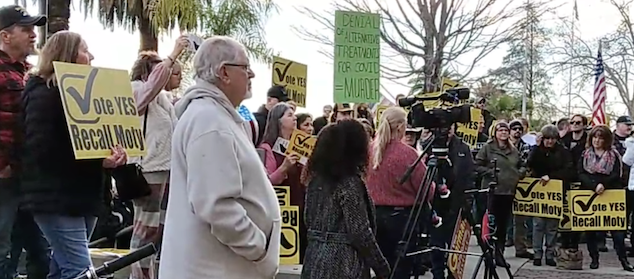News
Seeds of bitter recall politics sprouting across the state
 Pro-recall forces gather in Redding during the campaign. (Photo: Jefferson Public Radio)
Pro-recall forces gather in Redding during the campaign. (Photo: Jefferson Public Radio)For two years now, Shasta County has been the center of a fight between moderate Republicans serving on the board of supervisors and local far-right activists and militia groups who have taken issue with the state’s public health restrictions.
But what began as an intensely local political fight captured attention across the state, in part because others worry whether a similar battle could come their way.
“I’d like to say this is a canary in a coal mine, but it’s a whole flock of canaries at this point,” said Mike Madrid, a veteran California political strategist and cofounder of the Lincoln Project. In addition to a number of local flareups, he noted that a member of the Proud Boys is running for the state Assembly in the 8th District in suburban Sacramento against Democrat Ken Cooley.
The recall was preceded by threats, intimidation, and hostility stemming from local activists’ anger over public health restrictions.
In Nevada County, for example, an activist group that opposes an array of public health measures relating to the COVID-19 pandemic, are seeking the recall of all the members of the board of supervisors.
Earlier this month, far-right activists scored a victory in their crusade against the Shasta County board when 56% percent of voters chose to oust Supervisor Leonard Moty from office in a recall election.
The recall was preceded by threats, intimidation, and hostility stemming from local activists’ anger over public health restrictions put into place to prevent the spread of COVID-19 and its variants.
While no one on the five-member board actually supported these restrictions and have done little to enforce them, the activists took issue with three of the five board members — Joe Chimenti, Mary Rickert, and Leonard Moty — who they viewed as corrupt and unwilling to do enough to rebuff the restrictions imposed on the county by the state.
While the recall effort was initially started against all three of these members, the group only got enough valid signatures to trigger an election against Moty, a Republican, veteran politician and former chief of police in Redding.
Moty was recalled.
Tim Garman, the leading candidate to replace Moty, attended a “victory” party hosted by the Cottonwood Militia, which was a key player in the recall effort. Many of its members voiced their complaints at public meetings, held a town hall with candidates and have been filming a documentary about the recall.
This movement, fueled by a lack of trust in government, is part of a wider trend of extremist politics pushed by those on the far right.
At one such meeting recorded by the militia for the documentary, Carlos Zapata, a leading figure in the movement, made it clear that they had had enough.
“Right now, we are being peaceful and you better be happy that we’re good citizens, that we’re peaceful citizens,” he said about 3:45 into the documentary. “But it’s not going to be peaceful much longer. Okay?… I’m telling you that good citizens are going to turn into real concerned and revolutionary citizens real soon.”
This movement, fueled by a lack of trust in government, is part of a wider trend of extremist politics pushed by those on the far right who are looking to gain power and spread their anti-government agenda.
Madrid has been warning about this extremist trend and is concerned about its popularity among Republicans.
“This has been happening for a number of years. They’ve appeared as isolated incidents but they’re now becoming a very mainstream movement in today’s California Republican Party.”
Nowhere is it more mainstream than in Shasta County, where Moty’s loss now makes militia-aligned members a majority on the board of supervisors.
“It’s happening in San Diego County, it’s happening in Orange County, it’s happening in school boards in many counties — rural, urban, suburban — in California.” — Mike Madrid
Even Moty now seems to recognize the strength of this ultra-conservative faction.
“I think it’s going to be a change in our politics. I think we’re going to shift more to the alt-right side of things,” he told The Guardian
The militia and the activists who worked on this recall certainly see this recall victory as a shift towards their cause.
Their documentary titled “Red White and Blueprint” clearly suggests that they want this to serve as an example of how to carry out similar efforts across the state beyond rural Shasta County, which has about 180,000 inhabitants, half of them in Redding.
Madrid also seems to be aware of their ambition and already sees this happening in different parts of the state.
“It’s happening in San Diego County, it’s happening in Orange County, it’s happening in school boards in many counties — rural, urban, suburban — in California,” he said. “They just happened to be most successful at this point in time in a Northern California county.”
—
Editor’s Note: Joshua Aalcides is a Capitol Weekly intern from UC Davis
Want to see more stories like this? Sign up for The Roundup, the free daily newsletter about California politics from the editors of Capitol Weekly. Stay up to date on the news you need to know.
Sign up below, then look for a confirmation email in your inbox.

Leave a Reply